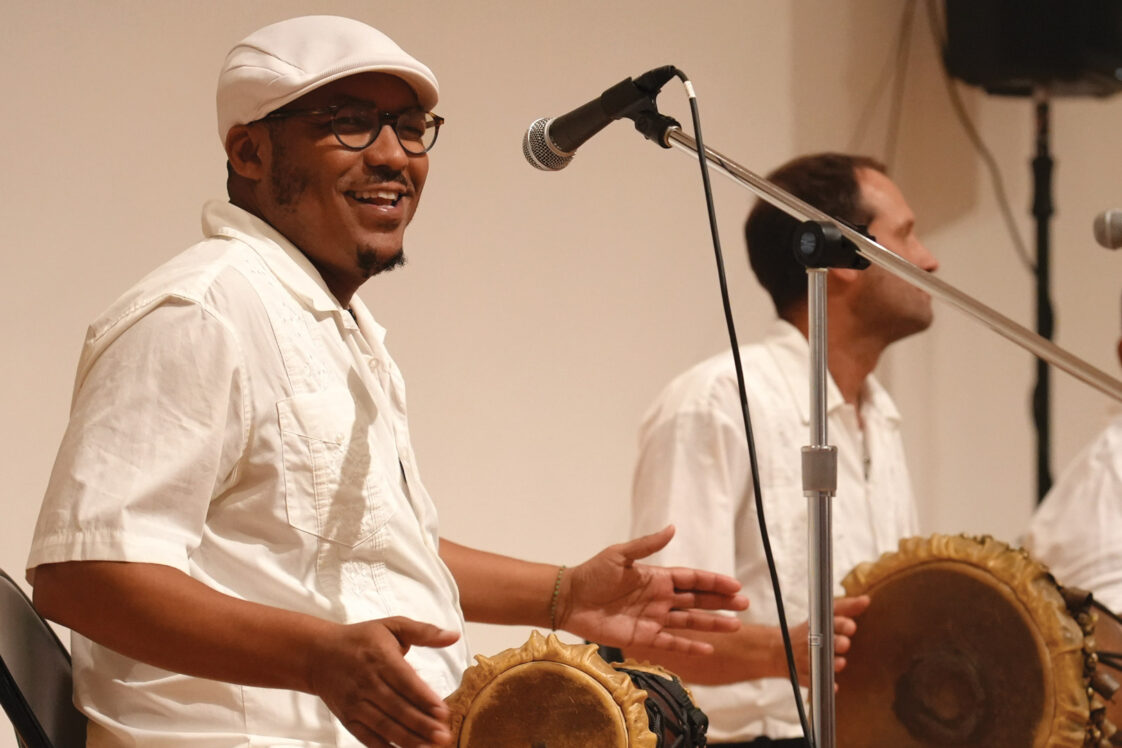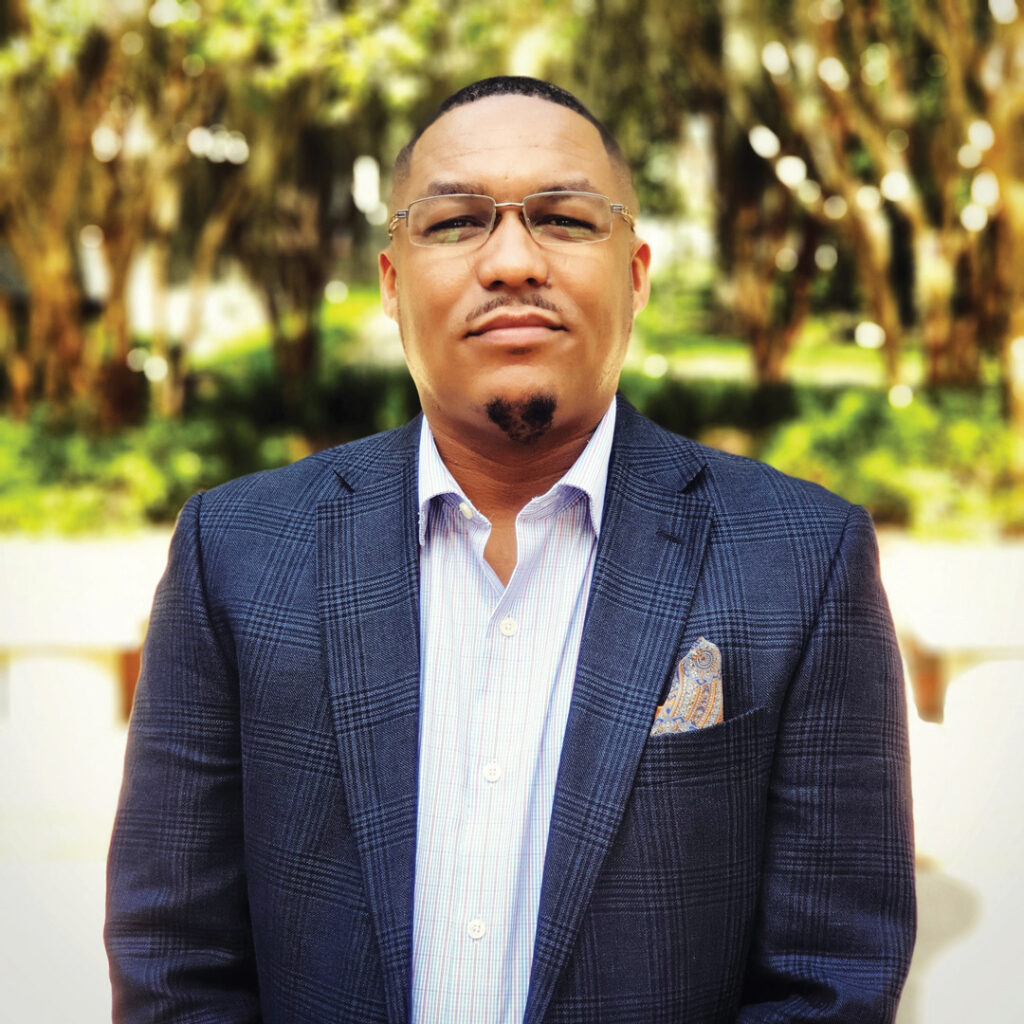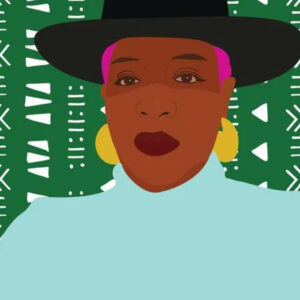He didn’t plan to return to his hometown, but when engineer, musician and administrator Oṣubi Craig saw the opportunity to lead UF’s Center for Arts, Migration and Entrepreneurship, he knew it was too good to pass up. CAME launched in 2020 to study and foster the cultural and economic contributions of diaspora communities, with faculty research, a Maker in Residence, new creative works and community outreach. Here, Craig shares his hopes for the center’s global network of scholars and artists, how culture fuels the economy, and how a sandwich can be art. Craig was recently recognized with the Win Phillips Town Gown Relations Award for his work fostering relationships between the community, artists, creatives and researchers to utilize the arts for positive social change.
How do you explain the links between art, migration, and entrepreneurship?
The reason that people love Disney’s Food and Wine Festival is that you eat food from all over the world. It’s not just American food, it’s the fact that you get to taste food from everywhere. That speaks to the way in which we experience arts and culture. Food, music, dance, art — those are the sticky substances that keep people in communities. And when people are having arts experiences, the dollars that are churning inside of our community really begin to multiply. Americans for the Arts says that every dollar spent in an art space is circulated inside of our community at least six times. We want to figure out the ways that we cultivate environments for creativity and culture to flourish.
Why is that especially relevant in Florida?
When we look back at the recession of 2008, the economy and Wall Street going haywire, we were seeing those signs here in Florida before everybody else. Florida is a leader and a litmus test of what is going to be happening next. This intersection of arts, migration and entrepreneurship really defines what the new economy looks like, because there’s so many people, specifically from the Global South, coming to the States looking to build and chase the American dream. It is reshaping our state in really powerful and impactful ways. This uniquely situates culture makers to be on the forefront of growth and innovation. People don’t typically think of Florida as an art hub, yet the biggest art event in the world, Art Basel, meets in Miami every year. Florida is the true melting pot experience where art, migration, and entrepreneurship come together, and everyone wins in the process.
CAME has collaborations all over campus. How are you working across disciplines?
CAME has a robust Affiliate Faculty program made up of over 60 folks from all over the world, in and out of academia and across all disciplines. We’re working with one of our Affiliates on the pilot IGNITE program in the College of Engineering to bring creatives into the classroom to help students think outside the box through activating their creative energies. Similarly, we collaborate with the Center for Arts and Medicine through our SPARC352 program, using arts as a tool for engaging the greater Gainesville community around innovation, entrepreneurship and wellness. We are working on a project with our colleagues at IFAS to expand our research with SPARC352. We’re hoping to mobilize the relationships we’ve built and the networks IFAS has on the ground across the state to use arts programming as a bridge to engaging communities in a grassroots way that can improve outcomes in workforce development and wellbeing. It’s all really about leveraging not what arts is, but what arts can do when you bring the right people into the room to have a conversation.
What intrigued you about the opportunity to lead CAME?
The ambitious idea of creating a center like this was just incredible to hear about. And the opportunity to have a Maker in Residence for three years changes what’s possible because you get to go deeper. You have time for things to really marinate. As a drummer, engineer and Gainesville native, I jumped at the opportunity to lead this work in my community.
CAME’s first maker-in-residence, Qudus Onikeku, created Atunda, an artificial-intelligence-powered platform to copyright dance moves. What’s next?
We are negotiating funding with a major foundation to get 1,500 new dance moves into our AI protocol. We are really, really excited about what it represents — a tool to help dance artists document and get paid for their creations. We’re not just talking about protecting dance moves, we’re talking about protecting intellectual property. The management of the IP around digital spaces is going to represent significant economic opportunity for large companies. It’s also going to have to be mediated from a legal and technological standpoint. We’re going to provide people with a tool to say “I created this on this date, and I have proof.”
For the next Maker in Residence, we are looking for someone who has a focus in AI in the arts or arts in emerging technology. The moment is too ripe for us at UF to miss the opportunity of having somebody that can interface with the amazing capacity and tools that we have, along with the incredible faculty in the College of the Arts and relationships with innovators across campus. We can’t pass it up. It’s going to be the most significant hire for the center in our history, because of all of the opportunity that sits right now at our feet.
Your new associate director, Dr. Porchia Moore, brings a new perspective on museums and their evolution. What are your hopes for what CAME can do in that space?
She is a thought leader in museum studies. She is thinking about the future of those spaces, how to increase access and participation across all demographic levels to get more people engaged. So to have her in that spot as Associate Director opens up a level of scholarship and understanding that we’re really excited about. She gives us a new perspective on the big things we have to contemplate: How do we get our information out? What are the tools and technologies that we’re leveraging? How are we building durable partnerships not just on what’s happening now, but what’s going to be happening in the future? One of her first projects with us is to organize a CAME public syllabus: working with our affiliates to gather all the critical scholarship, research, podcasts, art and conversations happening right now at the intersection of arts, migration and entrepreneurship, with forecasts on what’s coming next and how these communities can prepare for the future. The beautiful thing about bringing people together is that all you have to do is get the right experts and keep them talking, and I think Porchia really understands that. She is a convener and a catalyst and we’re excited to have her help lead CAME towards the future.
The Center has affiliate faculty around the country and the world. What’s an example of a collaboration you’re excited about?
We have on board Saidah Nash Carter in South Africa, engaged around the entrepreneurial practices of migrants in those communities. Saidah is a founder of the Data Science and Innovation Lab in Capetown, looking to facilitate entrepreneurship for small-scale farmers, using shared storytelling to facilitate that work, and is partnering with another of our Affiliates, Amanda Concha-Holmes, in developing a National Endowment for the Humanities proposal to make a documentary series on the Hidden Stories of the South. We have another non-UF Affiliate out of Australia, Kate Golebiowska, who is a public policy researcher in international migration. She studies large datasets of migrant entrepreneurs, understanding that data and ways to improve outcomes in business, startup and entrepreneurship spaces, and is helping our team contribute to the College of the Arts strategic endeavors around business, entrepreneurship and career planning for its students. We have a faculty member at Wake Forest, Ariel Smith, who studies food truck culture as a growth space for entrepreneurs in Black and brown communities. People who work in those spaces might say, “I’m not an artist,” but then will give you a handcrafted, amazing sandwich that has all of these different cultural influences that come together. It’s not just good food, but also the folks who shape, lead, and provide for their communities and sustain their economies. For us, having access to experts like this to help us move the needle on our work is definitely representative of what CAME is all about.
You’re also a musician. How does your creative practice inform your approach to research?
As a drummer, I try to do a lot of listening. Any musician worth their salt needs to get on the bandstand and listen to what everybody else is playing, even if you’re out front soloing. As a director, I know that in the end I am responsible for the decisions that are made, but I do my best to bring in everyone’s voice. And I think one of the things that has been an asset for me being both a higher ed administrator and arts administrator is that I can relate to artists, having lived as a performing artist for years. The challenges, the issues, the timing — I’m able to parse that out and speak to artists in a way that’s not just hypothetical, but resonates with lived experience.
When you think big about CAME’s future, what do you envision?
CAME is about culture in motion — we want to connect communities, creativity, and innovation on both a local and global scale. Just like IFAS is a land grant arm for UF’s agriculture activities, we imagine CAME also leveraging our relationships with makers and innovators to extend the work that we do, and its benefits, beyond the college campus and local community. I would love to have representation outside of Gainesville — to have programming and potentially staff in Jacksonville, in Orlando, in Tampa and South Florida. To be in the places where the action is happening at a different scale, I think that is where you get to a different level of impact — bringing arts, culture, and entrepreneurship experiences to all Floridians.
Source:
Oṣubi Craig
Director, UF’s Center for Arts, Migration and Entrepreneurship
ocraig@arts.ufl.edu



